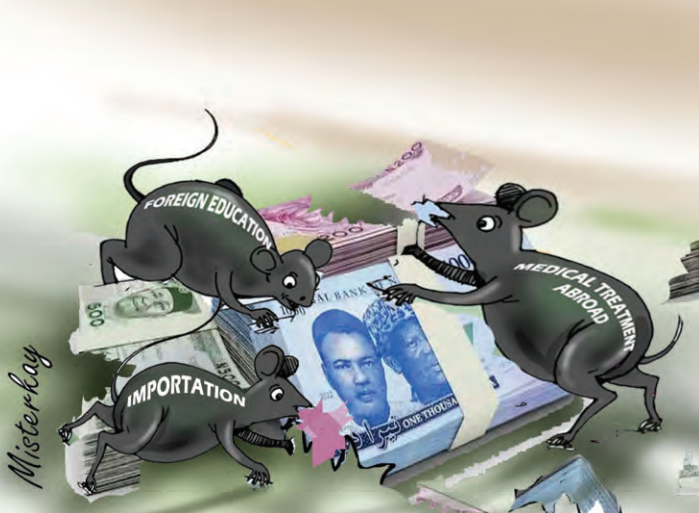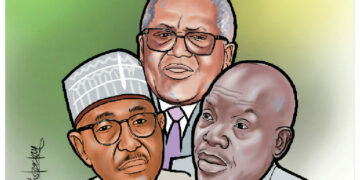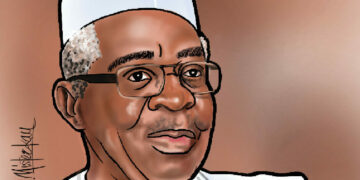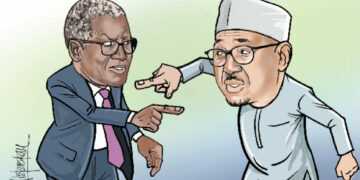I don’t envy the Governor of Nigeria’s Central Bank (CBN), Yemi Cardoso, who appears to be having the most difficult job in the country at the moment. The sustained downward spiral in the value of the naira and the attendant general lull in the economy have shifted all eyes to the CBN. And as the man on whose table the bucks stop, Cardoso is, to put it mildly, under severe pressure to radically and urgently turn things around for the better.
Undoubtedly, the desire to see an improved economy is topmost in the ranking of the needs of most patriotic Nigerians, some of whom are currently preoccupied with seeing the government stabilize the nation’s incredibly wobbling economy.
Truth be told, the Nigerian economy is in a downward spiral. People are suffering. Prices are rising almost by the minute. More and more families are getting trapped in the poverty web. There is hardship in the land, pure and simple. What the populace yearns for is an economy grounded in stability, one that promises an improved standard of living for citizens.
Waning value of the naira
There is no contesting the fact that the Nigerian economy is at its worst moment with escalating prices, burgeoning poverty, and pervasive hardship becoming the inescapable realities, painting a stark portrait of the nation’s economic plight.
At the heart of this worrisome scenario is the alarming rate of inflation which has contributed significantly to the waning value of the naira in the midst of a worrisome foreign exchange crisis.
Earlier this week, a dollar traded for N1,582 at the official market and N1,660 at the parallel market, after reaching an all-time high of $1/N1,900 at the parallel market. While the demand for dollars in the nation is high, its supply is low owing to high import amidst very low export; the rush for foreign education, medical tourism and the high and middle classes’ insatiable appetite for foreign goods and services.
According to the CBN, between 2010 and 2020, foreign education expenses gulped $28.65 billion while $11bn was spent on medical treatment abroad within the same period. All of these have continued to put pressure on the naira making it increasingly volatile. But who will save the naira?
Ned Nwoko’s proposal
As we grapple with the free fall of the Naira and the near-collapse of the economy, Nigeria’s Senator and solicitor, Supreme Court of England and Wales, Senator Ned Nwoko, emerges as a proponent of decisive action to salvage the national currency and rejuvenate the economy.
Through legislative initiatives such as the “Urgent Call for Immediate Prohibition of the Use of Foreign Currencies in Nigeria” and the “Bill for an Act to Alter the Central Bank of Nigeria Act, 2007,” Ned Nwoko who currently represents Delta North at the upper chambers of Nigeria’s National Assembly advocated a total ban on dollar transactions in Nigeria.
For Ned, to make the naira rise again, Nigeria must discard the use of dual currencies. The dollar should be banned completely in the country with the use of naira made compulsory for everyone in the country as the only legal tender.
While advocating for the sale of crude oil in naira and incentivizing tourism by mandating visitors to transact in the local currency, Nwoko insists that restoring the lost value of the naira entails ending policies that are detrimental to its stability.
‘The alarming depreciation of the Naira against the dollar is exacerbated by the demand for foreign currency to pay professional services in dollars. This not only erodes confidence in the domestic currency but also widens socioeconomic disparities within the country,” he noted.
Boost export, save the naira
To address the current volatility of the naira, the nation needs to look inward and effectively explore the possibility of boosting exports. The naira cannot be strong when the nation relies heavily on imports.
Ours is a country that exports crude oil and imports refined petroleum products due to operational inefficiencies plaguing domestic refineries. The nation must fix its refineries and refine locally!
The nation’s reliance on imported automobiles also exacerbates the plight of the naira. Over 90% of the automobiles in the country are imported using dollars and other foreign currency yet we are alarmed that the naira is tumbling.
Despite having vast arable land for the cultivation of different food and cash crops for local consumption and import, our agriculture sector is in a quagmire. Banditry and kidnapping have made it difficult, I dare say impossible, for farmers to cultivate their lands. We are left with one option: rely on import and in so doing, strain the naira. But who will save the naira?
It is laughable to expect a strong naira when the nation favours importation over local production there by helping to create jobs for other countries while worsening the unemployment at home. Confronting the prevailing currency volatility requires a concerted effort to bolster export activities.
Essentially, to strengthen the naira, we must move beyond mere economic discourse by taking actions that will safeguard the nation’s fiscal integrity and nurture sustainable growth. Through thoughtful policy formulation, legislative reform, and a steadfast commitment to local production, Nigeria can chart a course towards economic resurgence.




